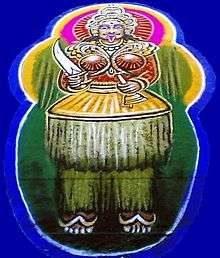Jumadi
| Jumadi | |
|---|---|
| Protector of humanity | |
 A rangoli depiction of Jumadi drawn at Jumadi saana of Belle Badagumane in Moodubelle, Udupi in 2008 | |
| Devanagari | kannada |
| Affiliation | Combined form of Shiva and Parvati |
| Abode | Kailasa |
| Mantra | Om Namo Bhagawate Jumadi |
| Weapon | Kadsale(sword) |
Jumadi, also known as Dhumavathi, is a deity worshiped particularly in the Tulu Nadu[1] region of Karnataka and Kerala in India. Shrines dedicated to Jumadi can be found all over Tulu Nadu and Kerala.[2]
Legend
It is believed that there was great a demon, Dhumasura, who used to eat human beings. He had caused entire civilizations to vanish. He had a boon whereby he could be killed only by a person who was a man and a woman at the same time. Devotees prayed for Lord Shiva and his consort Parvati to descended from mount Kailasa to vanquish the demon. On their way, Parvati felt uncontrollably hungry. Shiva tried to satisfy her through various means but she could not be satisfied. At last, Shiva told Parvati to eat him to satisfy her hunger. Goddess Parvati tried to swallow Shiva, but Shiva would not go beyond her throat. At that moment Shiva and Parvati merged and were transformed into Jumadi, a male-female form. Jumadi had the face of a man and the part below the throat was that of a woman. In the throat of Jumadi was the sacred lingam and Jumadi wore a crown of nagas (snakes). Jumadi vanquished Dhumasura and thus became known as Dhumavathi – "the vanquisher of Dhumasura". Later, Jumadi took various other forms to vanquish other of Dhumasura's demon associates.
Worship
Jumadi is worshiped by various names like "Marlu Jumadi", "Kanteri Jumadi", "Sarala Jumadi", "Maley Jumadi and "Pancha Jumadi", in honour of the various forms Jumadi took to vanquish all the demons. The first person to worship this form of Shiva and Parvati became the bunta spirit, who is also worshipped along with Jumadi. The worship of Jumadi is considered incomplete without worshipping the bunta spirit. One of the major shrines of Jumadi is in Padre near Surathkal Mangalore .
Jumadi is considered a rajan-daiva (kingly spirit) and hence many members of the Bunt community have Jumadi as their family deity. An example is the Chowta Royal family who worship Jumadi at the Jumadi shrine in the palace of Mudabidri (Chowtara Aramane) and also at the shrine near their old palace of Puttige.[3] and also near their old palace of puttige. Jumadi is worshiped by the people of Tulu Nadu irrespective of caste. In some shrines, Jumadi is offered only Satvikka offerings: fruits, milk and other vegetarian foods. In other shrines, Jumadi is offered the blood of a rooster who represents Dhumasura. Later, the rooster is eaten by the devotees as Prasad, or given to the pambadas – the spirit impersonators.
See also
- Ardhanarishvara
- Bhuta Kola
- Bunts
- Dhumavati, a Tantric form of Parvati where she is described to have eaten Shiva
- Nagaradhane
- Theyyam
- Tulu nadu
References
- ↑ History of Tulu Nadu by Ramanand Shetty
- ↑ 'The land called south canara' by William Pais and Mendonca
- ↑ Brückner, Heidrun (2009). On an Auspicious Day, at Dawn: Studies in Tulu Culture and Oral Literature. Otto Harrassowitz Verlag. p. 67. ISBN 978-3-447-05916-9. Retrieved 2011-12-29.